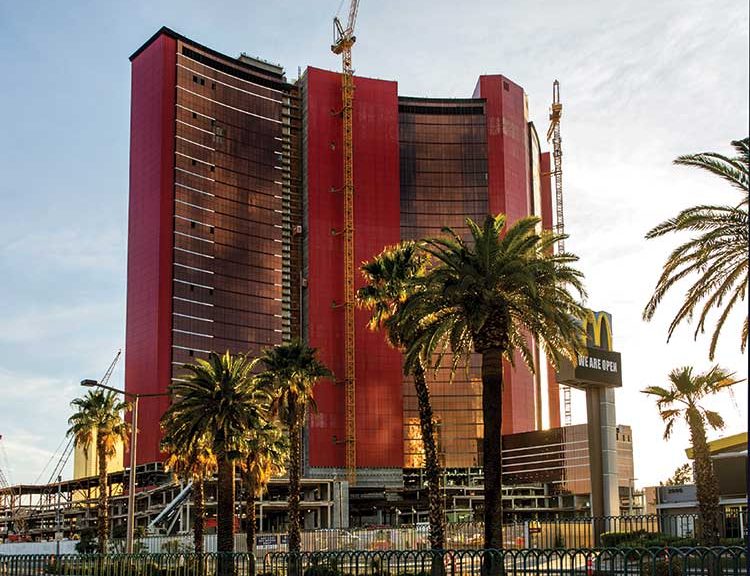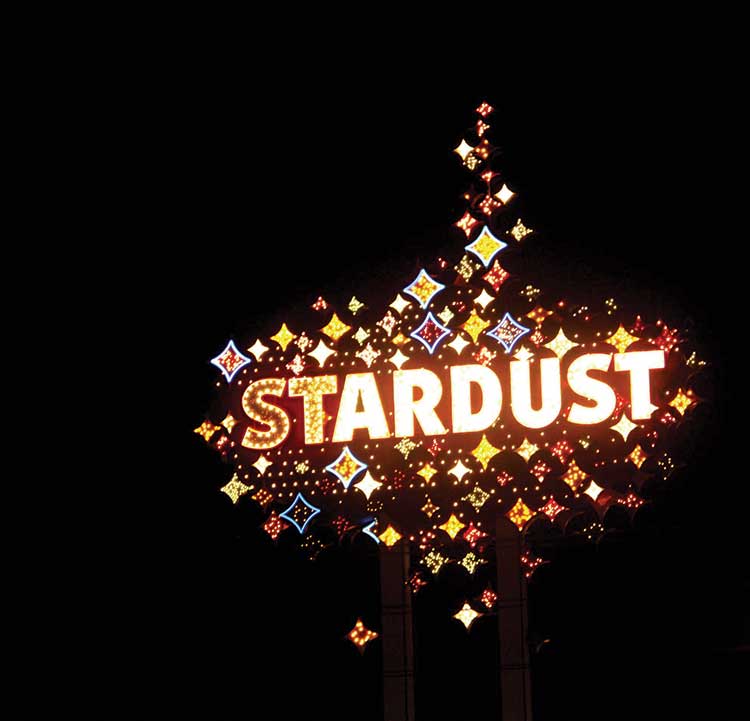As COVID-19 brings the Las Vegas Strip to a standstill, Genting Group may get its timing just right as it nears completion of the US$4.3 billion Resorts World Las Vegas.
Thirteen years after the legendary Stardust Hotel was imploded to make way and eight years after Genting Group acquired the site, Resorts World Las Vegas may have gotten its timing just right. The US$4.3 billion integrated resort at the north end of the Strip figures to take a starring role in Sin City’s post-coronavirus grand re-opening as the leading new attraction of the 2021 US summer vacation season, coinciding with the 50th anniversary of Genting opening its flagship mountaintop property outside Kuala Lumpur.
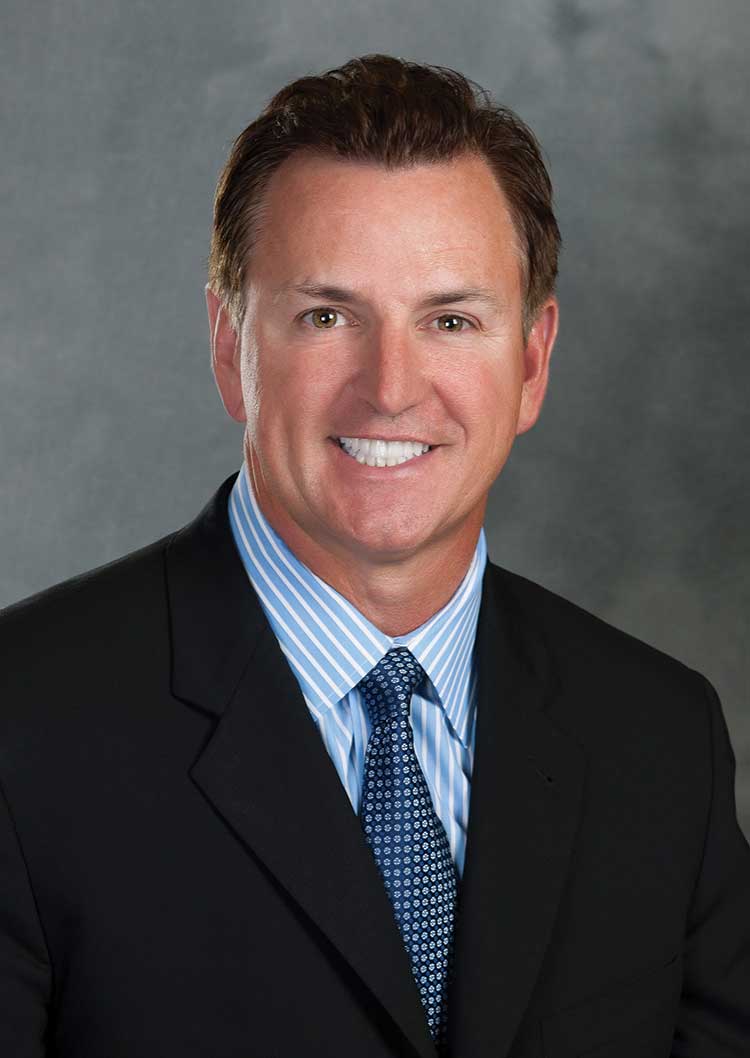
For perspective: While Sheldon Adelson was pushing package tours, Steve Wynn was flogging booze along the Strip and MGM was making movies, Genting Highlands, now known as Resorts World Genting (RWG), opened, launching what grew into the largest IR complex in Asia. Reversing the tide of Las Vegas operators crossing the Pacific, Genting brings to the Strip a wealth of experience from the region that’s become the epicenter of global gaming. Moreover, RWG thrives in Malaysia, where the government bars Muslim citizens, a majority of the population, from its casino. Thriving under those conditions should translate well to Las Vegas, where non-gaming spending accounts for two-thirds of revenue.
Genting’s decades of success in Malaysia under founder Lim Goh Tong and Lim Kok Thay, who succeeded his father as chairman in 2003, paved the way to winning one of Singapore’s two coveted casino licenses in an international competition. Resorts World Sentosa, featuring a Universal Studios theme park, water park, destination spa and world class aquarium, has earned billions of dollars and legions of admirers in its decade of operations.
But RWLV isn’t about what Genting has done in Asia, nor what it’s done as the largest casino operator in the UK or owner of three cruise lines plying the globe.
“We’re bringing a state of the art property that will enable the guest experience to be seamless and like no other on the Strip,” RWLV President Scott Sibella says, “an incredible, beautiful property that will have amenities for all aspects of guests that come to Las Vegas.”
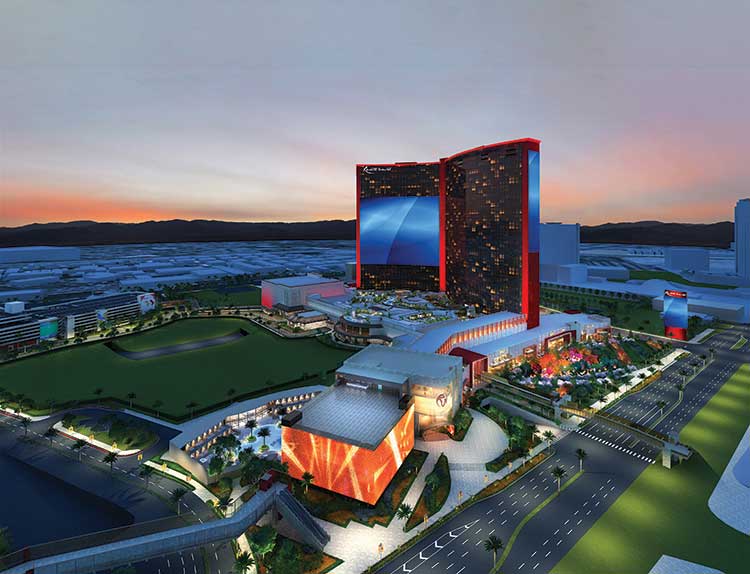
A former MGM executive, Sibella adds, “You see, what’s going on in Las Vegas is it’s becoming more of a corporate entity that operates the properties. Our chairman doesn’t operate that way. Genting operates its properties independently with support from corporate, but the pulse has to be on the property.
“We want to get back to the days when it was all about the customer and employees, the good old Vegas days. I think having one property, not this big overhead of corporate, we can accomplish that. That’s what our goal is.”
TWIN TOWERS
Scheduled to be the first all-new resort to open on the Strip since The Cosmopolitan in 2010, RWLV’s two Paul Steelman-designed black-clad, red-trimmed 59-story towers topped off last August. The towers will house 3,500 guest rooms under the Hilton, LXR and Conrad brands, announced in February as Hilton Hotel’s largest ever multibrand deal at one property.
Along with the 110,000 square foot (10,220 square meter) casino, the IR will have a sky casino, a 5,000 seat theater aiming to host “A-list residencies” and 350,000 square feet of MICE space.
The resort also promises cutting edge technology including a 50-foot (15 meter) video globe and LED displays on both towers. The 100,000 square foot screen on the West Tower, closest to the Strip, will rank among the world’s largest building displays. Food concepts will range from Michelin star dining to street food.
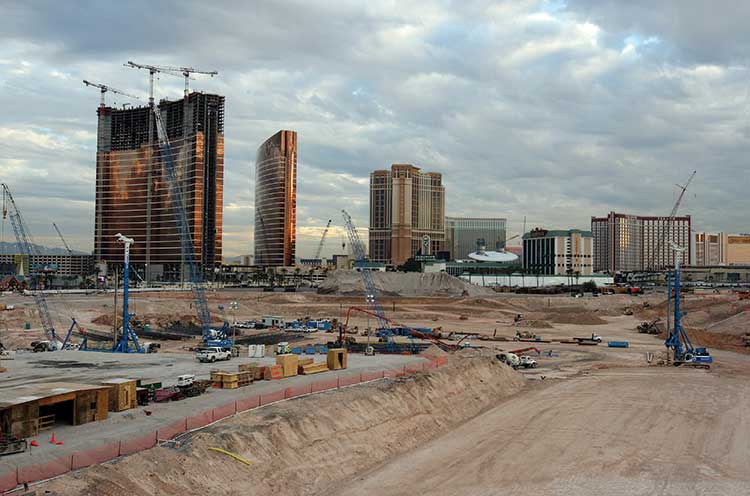
Sibella understands appealing to a wide swath of Vegas visitors. He spent eight years as President of MGM Grand, the Strip’s largest hotel with more than 6,000 rooms, reportedly instituting significant changes based on what he learned while working on the resort’s front lines as part of the reality show Undercover Boss. Sibella took a buyout in February last year in an MGM cost cutting program that shed several US senior executives.
Sibella is “a great hire” for RWLV, Las Vegas-based architect Paul Heretakis says, and should help the new kid on the Strip close the gap on rivals boasting databases of 30 million or more North American customers.
“He’s been in gaming most of his life and he certainly knows the customers and how to attract them, what to do to get them to the property and how to make them happy,” Heretakis observes.
ASIAN TOUCHES
The property’s design has evolved significantly since the acquisition. First envisioned with a miniature Great Wall of China and pandas, Genting now promises “Asian-inspired themes.” The property “will draw inspiration from its Asian roots mostly through service elements, honoring the time-honored traditions and hospitality of Asian culture that both the Genting and Resorts World brands are most known for,” Sibella says.
“There, of course, will also be Asian-inspired touches throughout the property, from textiles and color palette to artwork … weaving traditions of the Resorts World brand into the fabric of Las Vegas.” And, he promises, “The Asian food quality will be the best the Strip has ever seen.”
Asia has outstripped Las Vegas in terms of revenue and even in terms of design innovations-from the bright lights of Galaxy Macau’s gaming floor to NagaWorld’s casino cells to Marina Bay Sands’ rooftop infinity pool to Zaha Hadid designed Morpheus at City of Dreams Macau-and those attractive options keep more Asian players closer to home.
“It used to be they’d come to Las Vegas five or six times a year,” Heretakis, Vice President of Westar Architectural Group, says. “Now they’re starting to say, I’ll go to Australia once, I’ll go to Macau a couple of times, maybe with my wife and family, maybe with my guy friends.”
Nevertheless the Strip remains an aspirational destination for gamers worldwide.
“Las Vegas still has a great draw to it,” Heretakis believes. “The shopping, the restaurants are fabulous, shopping is cheaper in America, and Las Vegas has a tremendous amount of things to do, plus the quality of service they’re going to get, knowing how highly rated of a customer they are. They’re taken care of in many, many ways.”
GLOBAL APPEAL
The Asian market matters in Las Vegas, but only to a point.
“It’s very important, but only 5% of Las Vegas’s international market comes from the Far East,” RWLV’s Sibella says. “We can’t say, ‘Look, we’re here to get all the Asian guys to come from overseas or all the locals.’ We can’t survive on that. We’re building this to be a diverse property that will cater to all different types of customers, the high-end gamblers, the premium customers, the mass customers.”
Continues below
Stardust Memories
Resorts World Las Vegas promises a happy ending to a saga dating to 2003. After completing Borgata in Atlantic City, Boyd Gaming turned its attention to redeveloping Stardust, a Strip landmark opened in 1958 behind its twinkling neon sign that Boyd purchased in 1985.
Once the redoubt of mobsters, Stardust was the basis for Nicholas Pileggi’s book Casino, depicting the biggest gaming revenue skimming operation ever uncovered, fictionalized in the Martin Scorsese film starring Robert De Niro.
Boyd added to the original 50-acre Stardust site during the early 2000s, assembling a total of 88
contiguous acres (36 hectares). The Stardust closed on 1 November 2006 and, four months later, went out with a bang, imploded in a gala complete with fireworks.
In June 2007, Boyd broke ground on Echelon, a US$4.8 billion, 5,000 room integrated resort and began taking convention bookings for its scheduled late 2010 opening. The project was expected to fuel a boom at the north end of the Strip, joining James Packer’s Crown Las Vegas across the street. But in August 2008-five months after Packer shelved Crown Vegas – the global credit squeeze halted work at Echelon, a delay Boyd initially estimated at no more than a year.
But Echelon construction never resumed, and, as months turned into years of delay, the site’s eight-storey concrete and steel shells became infamous Strip eyesores. Genting bought the site in 2013 for US$350 million, less than the US$500 million Boyd says it spent to build the structures now incorporated into RWLV.
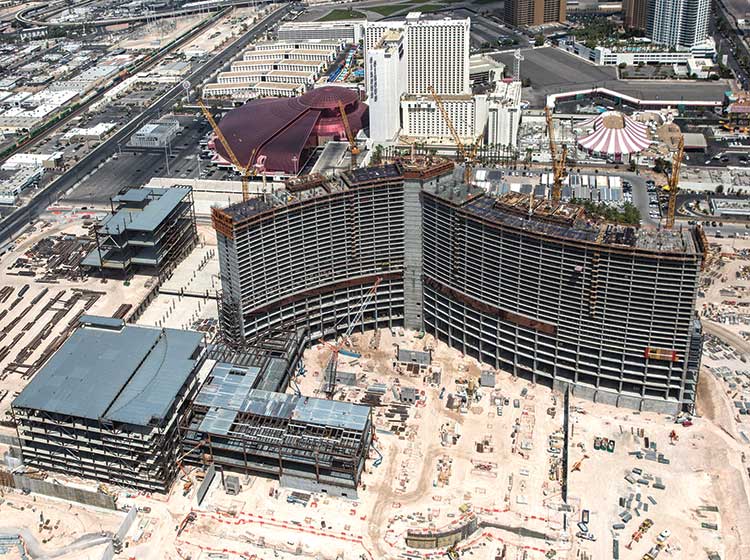
That kind of across-the-board appeal is embedded in Genting’s core DNA.
“Their property in Malaysia is absolutely spectacular,” Heretakis, whose firm’s Asia resort portfolio ranges from Korea to Vietnam, says. “RWG attracts a two star to five star-plus clientele, with amenities for all market segments. A lot of lessons they learned from that are going be very successful in Las Vegas.”
“The Las Vegas Strip is quite a bit different as it is a destination market and a very competitive market,” Union Gaming Securities’ Las Vegas-based analyst John DeCree says. “Operating in a market with multiple high quality competitors will be the biggest adjustment for Genting.”
Adds Euro-Asia Consulting President and CEO Stephen Karoul, “They have always been creative and demonstrated that capability with the expansion of Genting Highlands and the development of Star Cruises and eventual expansion abroad by financing the start of [tribal casino] Foxwoods and other opportunities.”
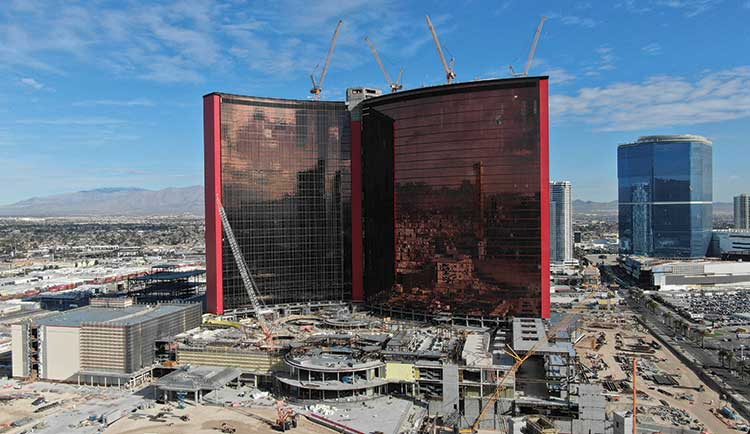
Genting’s expansionary impulses led to Resorts World New York City, an electronic gaming property that’s the only casino within the largest US city, operated through the group’s Genting Malaysia arm that also runs Resorts World Catskills 90 miles (145 kilometers) to the north.
“Among operators from East Asia, that presence makes Genting particularly suited to operate in Las Vegas,” Strategic Market Advisors Managing Director Matthew Landry says.
“The licensing and operating experience will be helpful, as will the customer base that could help support the Las Vegas operations. Genting has cultivated an Asian customer base in New York which will find the Las Vegas property compelling. The effective tax rate is substantially lower in Las Vegas, so they may be able to offer more incentives to players that they can’t serve nearly as well in New York.”
RWLV promises to be the first new Strip IR to open in the wake of COVID-19. With a year-plus of runway, “They have the opportunity to redefine the future of the gaming resort in this new world of ours,” Heretakis says. “They should take that opportunity to rethink those amenities, relationships and interactions.”
So far, COVID-19 has not changed the timetable for opening RWLV during next year’s North American summer, Scott Sibella confirms.
“We’re fortunate to be building in Las Vegas, a city with proven resilience and strength, and look forward to the day when our community can look back and say we overcame this together.”
Unlucky Dragon
Mention an Asian themed property in Las Vegas and thoughts turn to Lucky Dragon, the casino hotel targeting Asian players that went bankrupt within 16 months of its November 2016 opening. But industry insiders expect a different outcome for Genting Group’s Resorts World Las Vegas.
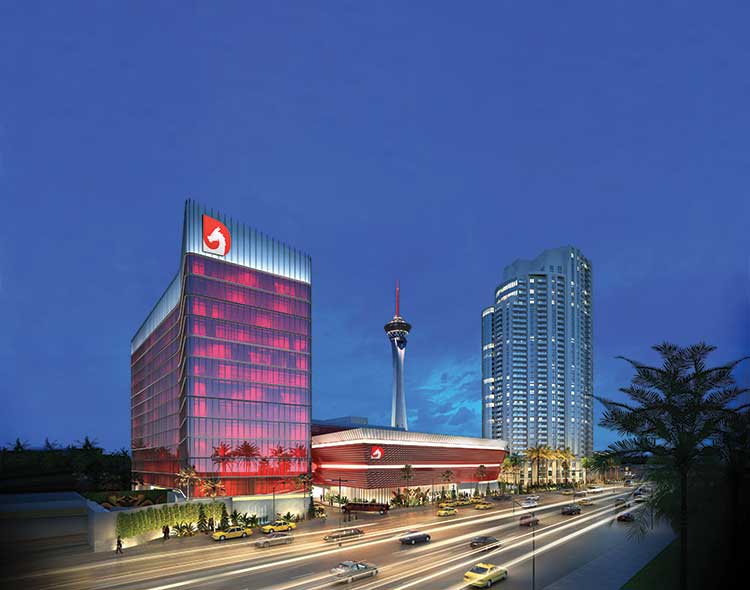 “Lucky Dragon was simply too small from a physical plant perspective. Genting will have a much better head start given the scale of their project,” Union Gaming Securities Senior Analyst John DeCree says. “Visitors to Las Vegas are looking for the Las Vegas experience.”
“Lucky Dragon was simply too small from a physical plant perspective. Genting will have a much better head start given the scale of their project,” Union Gaming Securities Senior Analyst John DeCree says. “Visitors to Las Vegas are looking for the Las Vegas experience.”
RWLV will be a US$4.3 billion IR with 3,500 guest rooms on the Strip; Lucky Dragon was a US$150 million, 202 room off-Strip property.
Co-owned by the families of former Las Vegas Sands President and COO William Weidner and local property developer Andrew Fonfa, Lucky Dragon tried to tap the local and California Asian market.
“They said they were differentiating themselves from the rest of the competition, but really they weren’t,” Westar Architectural Group Vice President Paul Heretakis says. “They bragged that they had Asian employees and Asian restaurants. Well, I can go to the Rio and the Gold Coast and the bathroom signs are in Asian languages.”
Adds RWLV President Scott Sibella, “I do think they made a mistake with Lucky Dragon when they came out and said they’re only catering to the Asian market. In this city, you have to be diversified.”
Sold in February 2019 for US$36 million to Donald Ahern, chairman and CEO of eponymous construction equipment firm Ahern Rentals, the property partially reopened late last year without gaming as the Ahern Hotel. The new owner plans to convert the casino into meeting and convention space with its grand opening slated for 4 July before coronavirus put tourism on hold.






